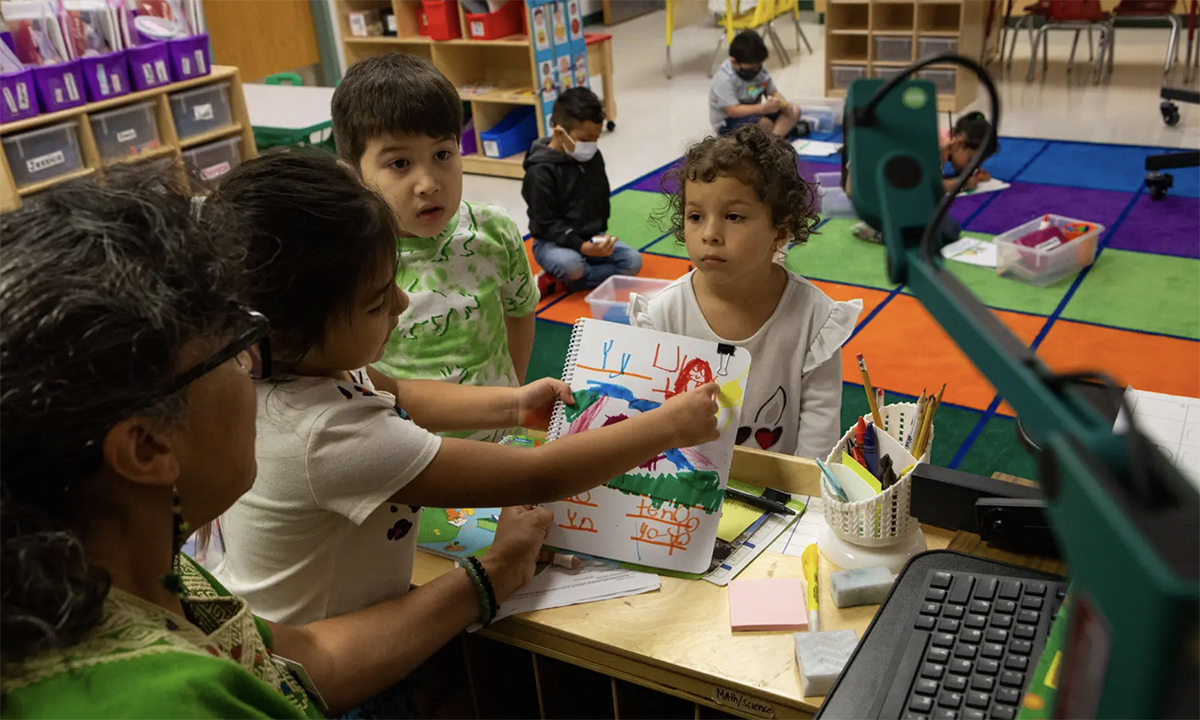Plurality of Texas Voters Say They Support School Voucher-Like Program
A new poll found support for redirecting tax revenue to help parents pay to school their kids outside the traditional public education system

Get stories like these delivered straight to your inbox. Sign up for The 74 Newsletter
A new poll sheds light on how Texas voters feel about one of the most hotly debated proposals of the legislative session so far: letting parents use tax dollars to take their kids out of public schools.
The University of Texas at Austin survey, released earlier this month, found 46% of voters supported the idea, while 41% opposed it. The 5-point margin was unchanged since the pollsters last asked the question in April 2022, but the political landscape has shifted significantly since then.
Gov. Greg Abbott has thrown his weight behind the proposal and is traveling the state to pitch parents on it, particularly in rural communities. The idea has historically faced opposition in the Legislature from Democrats and rural Republicans who are fiercely protective of public schools in their districts.
The latest survey was conducted in mid-February and included 1,200 registered voters. Notably, it did not find any rural divide; a plurality of rural voters — 46% — backed the proposal, compared to a plurality of 49% of urban voters. Suburban voters were more split, with 44% supporting and 45% opposing.
While that is good news for Republicans like Abbott, the poll also found the idea is not a high priority for voters when it comes to education this session. Sixty-four percent of voters said it was an important issue for the Legislature to address in the K-12 public education system, ranking eighth among 10 issues provided. The No. 1 issue was school safety, which 94% of voters called important, followed by “teacher pay/teacher retention” at 89% and “curriculum content” at 85%.
Abbott has named both “education freedom” and school safety as emergency items for the session, designating them as top priorities that lawmakers can pass off the floor immediately. But he has put the most effort into promoting “school choice” legislation lately, crisscrossing the state to try to show lawmakers the public support it enjoys.
Abbott regularly cites the 2022 Republican primary proposition on the issue, which passed overwhelmingly, including in rural Texas.
“In rural areas, if a Republican representative votes against this, they’re actually voting against their own constituents,” Abbott said in a recent TV interview.
Abbott is specifically championing education savings accounts, where the state would deposit funds for parents to subsidize the cost of educating their children outside the traditional public education system. The UT-Austin poll asked respondents whether they support “redirecting state tax revenue to help parents pay for the cost of sending their children to private or parochial schools.”
Oftentimes, school choice is framed around support of “vouchers,” which is similar to an educational savings account, except that the money from the state goes to the school instead of the parents.
When it came to voters’ overall priorities for the Legislature this session, the No. 1 issue was immigration and border security. Twenty-four percent of respondents said that should be lawmakers’ top priority, and no other issue registered double digits. The runner-up was inflation and the cost of living, which got 8%.
In other poll findings, Abbott’s approval rating declined slightly, with 46% of voters approving his job performance and 43% disapproving. In December, the survey found a 49-41% split.
For the first time, the pollsters tested how much Texas voters like Florida Gov. Ron DeSantis, a likely 2024 presidential candidate who seems to be jockeying with Abbott to be the nation’s most conservative governor. Forty percent of Texas voters said they had a favorable view of DeSantis, while 38% said they did not. That was not too different from how voters view Abbott — 47% favorably and 43% unfavorably.
But among Texas Republicans, Abbott is more popular, with an 85% favorability rating compared to 75% for DeSantis.
The poll also looked at how supportive Texas voters are of President Joe Biden running for reelection — and of his predecessor, Donald Trump, running against Biden. Wide majorities of voters in solidly red Texas agreed that Trump should run and Biden should not. But Texas Republicans were more supportive of Trump running than the state’s Democrats were of Biden running. Republicans said by a 23-point margin that Trump should run, while Democrats said by only a 7-point margin Biden should run.
The survey was conducted using an online panel from Feb. 10-21. The margin of error was plus or minus 2.83 percentage points.
Disclosure: University of Texas at Austin has been a financial supporter of The Texas Tribune, a nonprofit, nonpartisan news organization that is funded in part by donations from members, foundations and corporate sponsors. Financial supporters play no role in the Tribune’s journalism. Find a complete list of them here.
This article originally appeared in The Texas Tribune, a member-supported, nonpartisan newsroom informing and engaging Texans on state politics and policy. Learn more at texastribune.org.
Get stories like these delivered straight to your inbox. Sign up for The 74 Newsletter

;)
